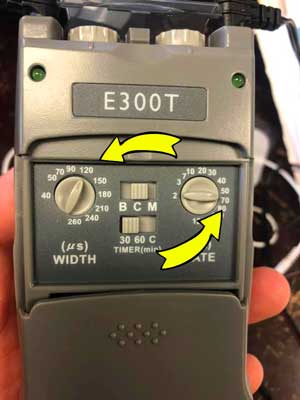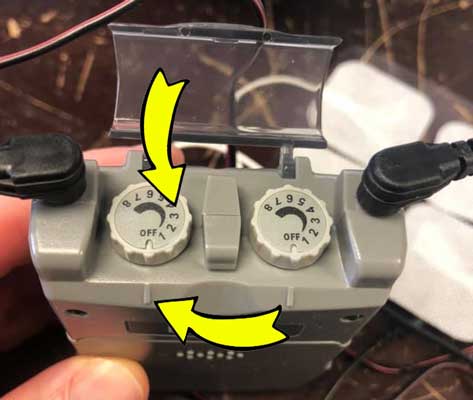Table of Contents
- TENS Unit for Knee Pain
- Contraindications for using TENS on Knee Pain
- Indication for Using TENS on Knee Pain
TENS Unit for Knee Pain
Transcutaneous Electrical Nerve Stimulation (TENS) is a non-invasive and drug-free method for pain relief that is increasingly being recognized for its effectiveness in treating chronic knee pain. Using a TENS for knee pain has proven to be a viable option for many individuals seeking relief.
What is TENS for Knee Pain?
A TENS unit for knee pain is a small, portable device that delivers low voltage electrical currents to stimulate the nerves and alleviate pain. It operates on the principle that electrical impulses can block pain signals from reaching the brain, thus providing the user with relief from discomfort. The device is typically composed of a power unit running on a standard 9 volt batter and connected via wires to TENS electrode pads. These pads are are placed on the skin near the source of knee pain.
When using a TENS unit for knee pain, the electrodes are strategically positioned around the knee, ensuring the electrical currents target the nerves transmitting the pain signals. The user can adjust the intensity of the electrical current to a level that is comfortable and effective for them. Each session with a TENS unit can last for a duration of about 20 to 30 minutes and can be repeated several times a day, depending on the severity of the pain and the individual’s response to treatment.
One of the significant advantages of a TENS unit is its convenience and versatility. It’s lightweight, portable, and easy to use, making it suitable for use at home, work, or even during travel. This means that pain relief doesn’t have to be restricted to a clinic or doctor’s office. Moreover, as TENS is a non-pharmacological method, it does not have the risk of side effects commonly associated with medications, such as drowsiness or dependency.
However, like any therapy, the effectiveness of a TENS unit for knee pain can vary from person to person. It’s essential to remember that while TENS units can effectively manage pain, they do not address the underlying cause of the knee pain. They should therefore be used as part of a comprehensive treatment plan, which may also include physical therapy, exercise, and lifestyle modifications.
While TENS units are generally safe, there are certain conditions, such as having a pacemaker or being pregnant, where their use is contraindicated. Therefore, if you’re considering a TENS unit for your knee pain, it’s essential to consult with your doctor or a physical therapist first to ensure it’s an appropriate and safe option for you.
A TENS unit can be a beneficial tool for individuals experiencing knee pain. It offers a non-invasive, drug-free alternative for managing pain and improving quality of life. By integrating TENS therapy into their pain management plan, individuals with knee pain can take an active role in managing their symptoms and achieving better day-to-day comfort.
What Are the Contraindications of Using a TENS Unit for Knee Pain?
While Transcutaneous Electrical Nerve Stimulation (TENS) units are generally safe and effective for many individuals experiencing knee pain, there are certain contraindications and precautions to consider. Understanding these can help ensure that you use the device safely and effectively.
One significant contraindication is the use of a TENS unit by individuals with cardiac pacemakers or defibrillators. The electrical impulses generated by the TENS unit can interfere with the function of these devices, potentially leading to serious or life-threatening consequences. As a result, people with these devices are typically advised not to use TENS units unless explicitly advised otherwise by their healthcare provider.
Similarly, TENS units should not be used by individuals with epilepsy without medical supervision. While the evidence is limited, there is a concern that the electrical stimulation may potentially provoke seizures in susceptible individuals.
Pregnant women, particularly those in their first trimester, should avoid using TENS units on the abdominal and pelvic regions, as the effects of electrical stimulation on fetal development are not fully understood. However, using a TENS unit for knee pain during pregnancy may be permissible under the guidance of a healthcare provider.
TENS units should not be used on areas of skin that are numb, irritated, infected, or have a rash, as the device may exacerbate these conditions and cause discomfort. The electrodes should also not be placed over the eyes, in the mouth, or on the front of the neck due to the risk of injury to sensitive tissues.
It’s also important to remember that TENS units are used for pain management and do not treat the underlying cause of the pain. If the knee pain is due to a severe condition such as a fracture, infection, or malignancy, relying solely on a TENS unit for pain management is not advisable. These conditions require prompt medical attention and treatment.
Moreover, some people may experience skin irritation or allergic reactions to the electrode pads used with the TENS unit. While this is not a contraindication per se, it’s something to be aware of, particularly for individuals with sensitive skin or known allergies to adhesives.
Finally, tolerance to the TENS unit may develop over time. This means that with regular use at the same frequency and intensity, the unit may not provide the same level of pain relief as when first used. To avoid this, it’s often recommended to vary the frequency and intensity of the stimulation during each session.
It’s always advisable to consult a healthcare provider before starting TENS therapy. Your provider can consider your overall health condition and specific circumstances to determine whether TENS is suitable for you. They can also provide guidance on the proper use of the device, including the appropriate settings, duration of use, and placement of electrodes.
For more information on the use of TENS units, consider this resource: Mayo Clinic: TENS therapy
When Should TENS for Knee Pain Be Used?
The application of a Transcutaneous Electrical Nerve Stimulation (TENS) unit for knee pain can be beneficial in various circumstances and at different stages of knee-related issues. It’s worth noting that the use of a TENS unit should always be under the guidance of a healthcare professional, who can provide advice on its appropriateness for individual conditions.
1. Chronic Knee Pain: TENS can be highly effective for managing chronic knee pain, which could be due to osteoarthritis, rheumatoid arthritis, or other long-term conditions. It works by blocking pain signals from reaching the brain and can provide relief when other non-invasive pain management strategies aren’t effective.
2. Post-surgical Pain: After undergoing knee surgery, such as a knee replacement, a TENS unit can help manage post-operative pain. This can aid in the recovery process, allowing patients to participate in necessary physical therapy and rehabilitation exercises with less discomfort.
3. Inflammation and Swelling: If you’re experiencing knee swelling due to an injury, strain, or other condition, a TENS unit might be beneficial. It can help reduce inflammation and promote healing by improving blood circulation in the affected area.
4. During Physical Activity: For individuals with chronic knee pain who want to remain active, using a TENS unit during exercise can help manage pain. This allows for continued participation in physical activities, which is crucial for overall health and well-being.
5. Acute Knee Pain: For sudden onset of knee pain due to an injury or strain, a TENS unit can provide immediate relief by interrupting the pain signals sent to the brain. It’s a drug-free alternative that can be used alongside other treatments such as ice, rest, and elevation.
However, it’s important to remember that a TENS unit should not be used as a substitute for professional medical advice or treatment. If knee pain is severe, persistent, or associated with other concerning symptoms, immediate medical attention should be sought. While a TENS unit can provide significant pain relief, it does not address the underlying cause of knee pain. Therefore, it should be used as part of a comprehensive treatment plan under the supervision of a healthcare professional.
TENS Recommended Settings for Knee Pain

TENS for Knee Pain Settings:
In my clinic I find the most comfortable TENS settings are 120 for the Width and 70 for the Rate.
I also find that most patients will start to feel the electrical stimulation at level 3 to 3.5. After a couple minutes of using the device it is often recommended to turn up the level as clients may no longer feel anything at 3 to 3.5.


